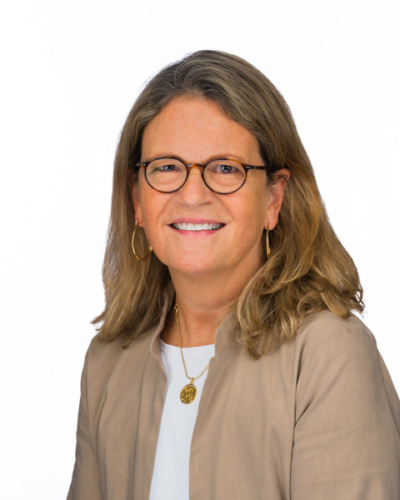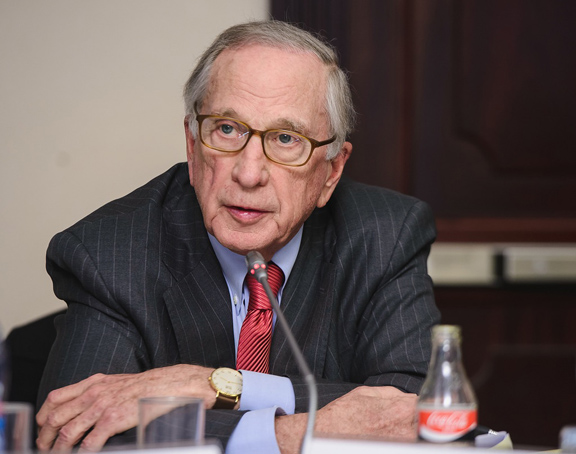
Mimi Hall
Vice President, Communications
Atomic Pulse
When media magnate, sportsman, and environmentalist Ted Turner decided he wanted to direct some of his philanthropy toward ridding the world of nuclear weapons, he turned to one of the world’s leading authorities on nuclear security: his fellow Georgian, former U.S. Senator Sam Nunn. In 2001, after a scoping study to determine whether a non-governmental organization could make a difference in an area that primarily is the purview of governments, the Nuclear Threat Initiative was born with Nunn at the helm as its first CEO.
Over the course of this year, as NTI marks its 20th anniversary, our experts will share some reflections on two decades of working to build a safer world—accomplishments and challenges, lessons learned along the way, visions for the future, and more.
We begin with our founder, Sam Nunn, who stepped down as CEO in 2017 and now serves as co-chair of the board with Turner and CEO Ernest J. Moniz.
What NTI accomplishments are you most proud of over the 20 years?
If you look at the broad picture, Ronald Reagan and Mikhail Gorbachev stated that a nuclear war cannot be won and therefore must not be fought. I think NTI came in and has, with others, put a couple of A's and B's under that.
I would say “A” would be that we helped build awareness and understanding that every country that has nuclear weapons or nuclear materials has the responsibility to safeguard those materials and to do everything possible to cut back on the risk. Through a variety of NTI projects, including our NTI Nuclear Security Index, I think we have helped foster important steps to reduce the global risk of nuclear terrorism.
Beyond that, in terms of where I think NTI has made a major contribution—again, with others—is that we must not just have an idealistic view of how you get rid of nuclear weapons and reduce the risk to the world. We have to take practical steps, and we have to do things together. There has to be not only the vision of a world in the future without nuclear weapons, but we have to have the guidelines and actions to get there.
So, A and B, I think, in broad terms, are significant contributions that NTI has made, of course in cooperation with a lot of other folks, both in and outside governments.
What would you say has been the most difficult task over time?
The most difficult tasks are the ones we're still working on. Probably number one in that category, in terms of importance, is getting to the realization both in Russia and the United States that together we have over 90 percent of the world’s nuclear weapons, and we have a mutual stake in preventing nuclear war, preventing blunder, having failsafe mechanisms to make sure there's no accident or miscalculation.
We also have a mutual stake in each other's warning systems. If theirs don't work, we are the ones who could be the victims and vice-versa. We have mutual stake in command and control. We have a mutual stake, but we haven't realized it yet or acted on it at least, in preventing cyber interference with command-and-control and warning systems, which could set off a nuclear war nobody wants by accident.
So, having that sense of we're sort of in this together, we're both riding the nuclear tiger, is the most difficult challenge. It would also include, I think, both of us having the vital understanding that we each need more decision time [before launching a nuclear weapon]. Short and compressed decision time greatly increases the risk that a leader of Russia or the United States makes a huge mistake. This kind of thinking also is imperative for other nuclear countries, including China and including Great Britain, including France, and also including Pakistan and India.
So, this may be the most important but also the most difficult challenge. Einstein said that a nuclear explosion changes everything except the way mankind thinks, and I think that remains true today. We have to think differently if we're going to avoid catastrophe.
Before you and Ted Turner and Charlie Curtis and the team created NTI, you did a scoping study, of course. I'm wondering if there's anything that surprised you about creating a non-profit in this space?
I've been pleasantly surprised by the generosity of so many people who are willing to support a non-governmental group working and urging governments to reduce the risk of weapons of mass destruction, starting of course with Ted Turner, but including Warren Buffett and many others who continue to this day to be generous in their support.
I think we had the big question mark of whether a non-profit organization staffed with skilled people, a lot of experience, and an international board could really make a difference. And I think the answer to that question after 20 years is yes, without any doubt, I think we have made a big difference.
You announced the creation of NTI in January of 2001, and then nine months later, 9/11 happened. That must have had a big impact on those first years of the organization. It really brought into focus what could happen—something truly catastrophic.
Yes, 9/11 gave our organization real impetus. We had already started, and we were already focusing on securing nuclear materials. It became pretty apparent to not just the United States but to the world that we had to secure nuclear materials globally because nuclear materials are the raw materials of catastrophic nuclear terrorism. President Obama picked up on that big time. Other administrations, the Bush administration, also emphasized that.
We do feel that one of the great impacts we've had is encouraging governments to do the heavy lifting and to get rid of weapons-usable nuclear materials everywhere they exist and to secure what cannot be eliminated in the best way we possibly can. This the most important thing we can do to prevent nuclear weapons being made by terrorists and exploded in cities around the globe. The heavy lifting has been done by governments and this will have to continue, but we have moved from about 40 countries with weapons-usable material down to 22 countries at this point. Every time we eliminate stockpiles of weapons-usable materials, we reduce the chances of catastrophic nuclear terrorism. We have come a long way, with a long way to go.
So, this is heavy, serious work. Has any part of it been fun for you along the way?
Well, if you're dealing with nuclear and biological threats, if you're having fun, they put a Dr. Strangelove cap on you immediately and probably appropriately so. So, I would say the better terminology would be a sense of accomplishment. I think I've had that on many occasions over the last 20 years. Beyond playing a role in the elimination of weapons-usable materials in many countries, NTI has created a nuclear index, measuring the risk in countries around the world, and we've done the same thing on the biological side. We have an international fuel bank, that we helped get off the ground with Warren Buffett’s amazing financial support, and that is now in Kazakhstan and run by the IAEA. The fuel bank will allow countries to go forward with civil nuclear programs while avoiding proliferation of enrichment which can create nuclear weapons. We've created a World Institute of Nuclear Security that is training people and companies around the world to reduce risk. We also, I think, made a major difference with the Shultz, Perry, Kissinger, Nunn articles in the Wall Street Journal about the lack of, what we call, the vision and the steps—a vision of the world without nuclear weapons and the steps and tools it takes to get there.
So, in all of these areas, I think we have made a difference and continue to, but the top of the mountain is a long climb, and it's a steep and rugged trail. As I've said many times, we have to go up that mountain one step at a time, sometimes more rapidly than others, and always recognizing it's not just one country. We have to have a number of countries going up that mountain together. There has to be worldwide cooperation under the Nuclear Non-Proliferation Treaty, which is sort of the map which sets forth terms of cooperation as to how you get to the top of the mountain both in terms of cooperation between countries with nuclear weapons and their obligation under the NPT and also countries that do not have nuclear weapons and have pledged not to have them. All of us have to go up to the mountaintop together.
Do you think nuclear weapons will still exist or will at least be very much on their way out by 2045, a hundred years after they were developed?
I hope that the next generation will be smarter in figuring it out than we've been, and I hope that we will ultimately be able to eliminate nuclear weapons from the world. But I think the more realistic picture is that we will take it step by step. If we are really serious about getting rid of nuclear weapons, we have to have cooperation on verification, understanding how you would verify dismantling a weapon, how you make sure everyone is complying with an agreement. So, all of those things have to be worked. It's not simply about having a declaration that there will be no more nuclear weapons. It takes not only that vision, which is enormously important, but it also takes actions and steps with countries working together.
So, I always want to remain optimistic, and I am optimistic that the next generation is going to be smarter than we are. The information age gives us the ability to communicate, and to make progress, you have to have young people in Russia talking to young people in the United States, young people in China, Russia, Europe, and Asia talking with each other and with those in the United States. We also have to build off of the same set of facts. The facts dictate the dangers, and the dangers mean that we are indeed in a race between cooperation and catastrophe. I think it's going to take the younger generation really acting on that premise by communicating together and building a common set of facts around nuclear as well as biological dangers.
How do you get young people to communicate and how do you get to a common set of facts among young people from Russia and China and Europe and so forth?
I would say there are probably many paths, but one path we’re working on at NTI is we’re getting schools—we’re starting with Georgia Tech, the Nunn school there—to deal with other schools and to have students and professors cross-pollinate, so to speak, with classes on these dangers. This would branch out to schools and universities in Russia and China and Europe as well as the United States and other countries. We have to use our technologies to reduce, rather than increase, risk.
So, having those young people working together, agreeing on the same set of facts and beginning to debate and discuss topics like how to reduce these risks to our own citizens and to the world. This is a pathway that I believe holds great promise for the future.
Sign up for our newsletter to get the latest on nuclear and biological threats.
